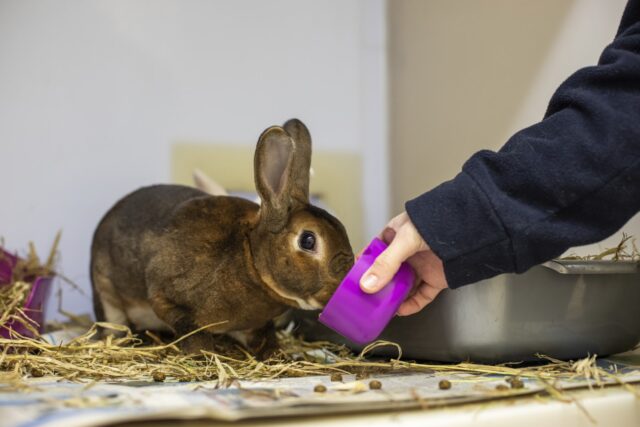
The RSPCA is urging owners to put the diet of their rabbits at the top of their shopping list this Easter.
Rabbits are often viewed as an ideal ‘starter pet’ for young children, particularly at Easter time, but they have very complex needs and are one of the most neglected pets in Britain. Last year the RSPCA fielded 1,082 reports of abandonments of exotic pets – which includes rabbits – while there were 1,144 incidents of neglect.
The charity’s experts are highlighting how an inadequate diet and a lack of dental care are storing up problems for the long-term health of bunnies. They are asking owners to take some time researching how to take proper care of their rabbits.
The latest PDSA Welfare Report (PAW Report) found that 42% of vets identified an inappropriate diet as one of the five most important welfare issues needing to be addressed to improve the health of rabbits. The study showed that 13% of owners were feeding their rabbits unhealthy muesli mix, while more than half of vets noted that owners lacked knowledge of basic care needs.
Rabbits have a complex digestive system and a healthy diet should mainly consist of good quality hay and grass as well as clean drinking water.
Many of the rabbits coming into RSPCA care are struggling with dental problems. A rabbit’s teeth are growing continuously and need to be worn down with a constant supply of high fibre from their diet.
RSPCA small animal welfare expert Dominika Jagoda said: “Rabbits can make fantastic pets – but their welfare can be significantly compromised due to inadequate diets. It is so important that owners feed rabbits appropriate foods in correct proportions.
“They need a healthy diet consisting of 85% good quality hay or grass, 10% greens such as kale, cabbage or parsley, and 5% good quality nuggets, as well as clean drinking water to provide the food that mimics what they would eat in the wild.
“Dental health can have such a huge impact on the overall welfare of rabbits and them not being able to eat because of overgrown teeth is very dangerous. It can lead to serious health conditions and can be potentially fatal.
“We know Easter is always a popular time of year to add a rabbit to the family, but it’s vital people do their research and fully understand the complex needs these amazing animals have.”
The RSPCA advises owners to take their rabbits for regular health and dental checks to head off health problems. It will also save them potentially eye-watering bills for specialist dental treatment amid the cost of living crisis should their pets’ teeth deteriorate.
Amid the crisis, 30% of pet owners are worried about being able to care for their pets properly, according to the RSPCA’s Animal Kindness Index.
“Dental issues in rabbits can be expensive to fix, so prevention by feeding them with the correct diet can save owners a lot of money in the long run,” added the small animal expert.
“Rabbits have continually growing teeth which need to be worn down and kept at the correct length. They need a constant supply of high fibre passing through their digestive system in order to drive the movement of food through the digestive system.”
The challenges some owners have had in caring properly for rabbits has likely contributed to a surge in rabbits being abandoned and given up. Rehoming rates from RSPCA and other animal centres have slowed down in recent years – and many centres are full of rabbits.
There was a large 48 per cent increase in the numbers of rabbits arriving at RSPCA animal centres in 2022 compared to 2021. RSPCA animal centres took in 1,090 rabbits and 1,942 were rescued by RSPCA branches.
Last year (2023) 453 rabbits were rehomed from RSPCA national animal centres compared to 603 in 2019, a fall of 25% in four years (these figures exclude RSPCA branch network rehoming).
The RSPCA has previously backed calls by the Rabbit Welfare Association and Fund for a rabbit breeding amnesty to help reduce the rabbit population and safeguard rabbit welfare.
The charity says prospective owners need to consider the commitment they are taking on. Rabbits can live between eight and 12 years of age and they need spacious accommodation both indoors and outside.
“They need so much more than just a hutch at the end of the garden and are very complex animals with needs for company, stimulation and exercise,” added Dominika. “When they are bought on impulse, maybe as an Easter gift, an owner might underestimate how much time, money and commitment they require.
“But for anyone who has done their research and is certain they can provide the time, space, money and care it takes to look after a pair of rabbits then please consider adopting two of the many rescue rabbits in need of a home instead of buying them.”
There is further advice on how to take good care of rabbits on the RSPCA’s website. RSPCA centres are pleased to welcome approaches from anyone interested and able to offer a forever home for one of their rabbits.



